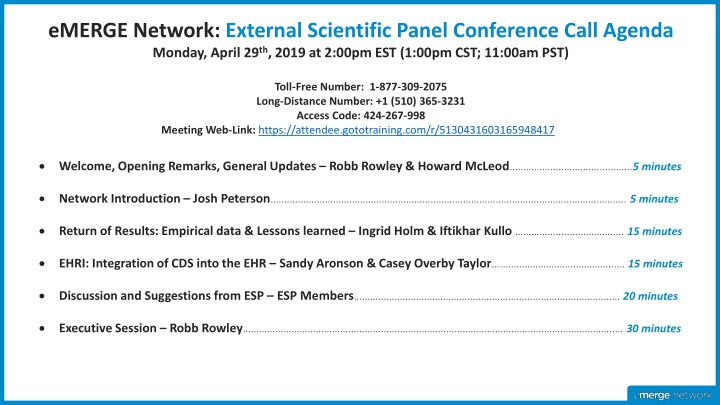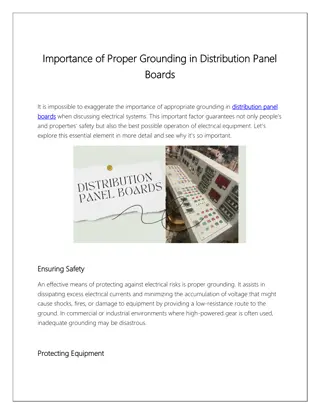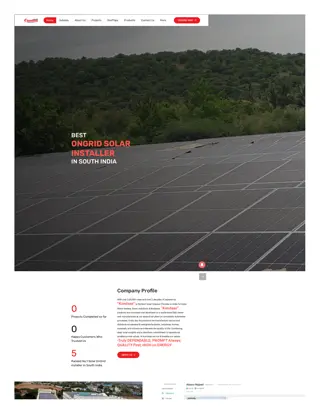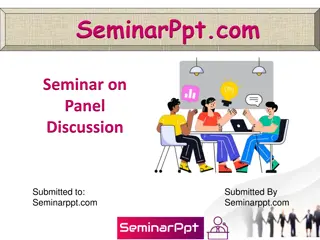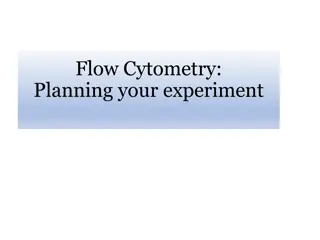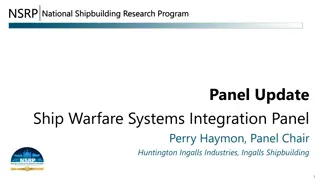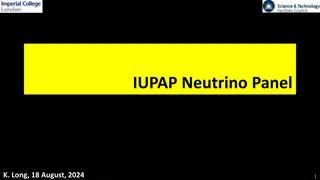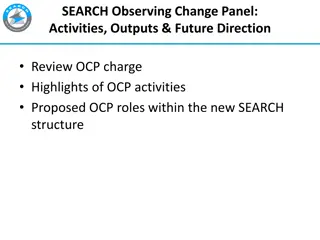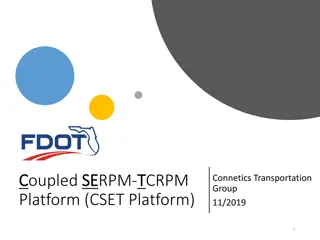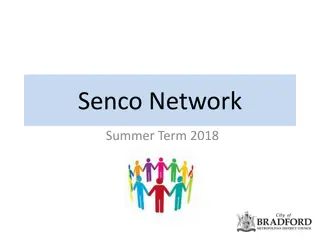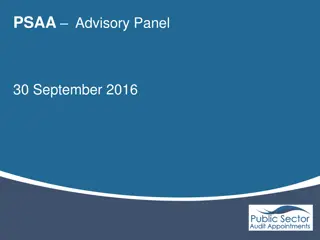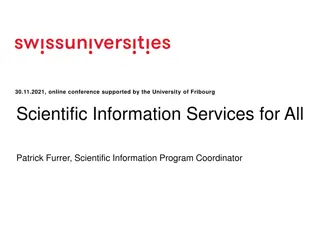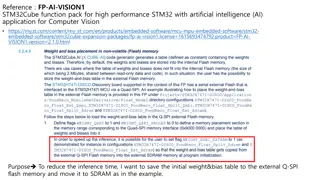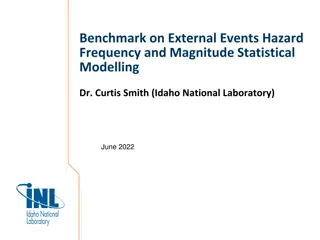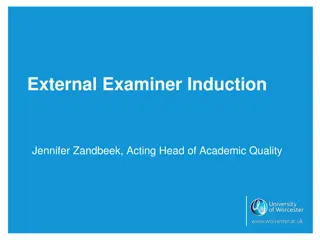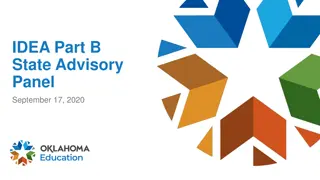Emerge Network External Scientific Panel Conference - Agenda & Accomplishments
An agenda for the eMERGE Network External Scientific Panel Conference on April 29th, 2019, showcasing discussions on return of results, EHRI integration, and network accomplishments of sequencing participants. The network has achieved significant milestones with over 25,000 samples sequenced, outcomes forms harmonized, and electronic phenotypes developed. Lessons learned panels and upcoming topics in genomic medicine are highlighted, emphasizing the dissemination of knowledge and shaping translational research in the field.
Download Presentation

Please find below an Image/Link to download the presentation.
The content on the website is provided AS IS for your information and personal use only. It may not be sold, licensed, or shared on other websites without obtaining consent from the author.If you encounter any issues during the download, it is possible that the publisher has removed the file from their server.
You are allowed to download the files provided on this website for personal or commercial use, subject to the condition that they are used lawfully. All files are the property of their respective owners.
The content on the website is provided AS IS for your information and personal use only. It may not be sold, licensed, or shared on other websites without obtaining consent from the author.
E N D
Presentation Transcript
eMERGE Network: External Scientific Panel Conference Call Agenda Monday, April 29th, 2019 at 2:00pm EST (1:00pm CST; 11:00am PST) Toll-Free Number: 1-877-309-2075 Long-Distance Number: +1 (510) 365-3231 Access Code: 424-267-998 Meeting Web-Link: https://attendee.gototraining.com/r/5130431603165948417 Welcome, Opening Remarks, General Updates Robb Rowley & Howard McLeod .. .. ..5 minutes Network Introduction Josh Peterson . . . .. 5 minutes Return of Results: Empirical data & Lessons learned Ingrid Holm & Iftikhar Kullo .. .. 15 minutes EHRI: Integration of CDS into the EHR Sandy Aronson & Casey Overby Taylor .. .. 15 minutes Discussion and Suggestions from ESP ESP Members . . 20 minutes Executive Session Robb Rowley .. 30 minutes
eMERGE Network Accomplishment: 25,380 eMERGEseq participants sequenced Analysis 1: Non indication-based consensus returnable results (n=25,068) Positive 4.2%* (n=1042) Negative 95.84% (n=24,026) * >12 reports had two pathogenic variants. Skewed positive rate due to one site with sample selection based on suspicious genotype (17% positive) Analysis 2: cases with indication- based returnable results (n=9219) Inconclusive 2.2% (n=202) Negative 95.6% (n=8816) Positive 2.2% (n=201) eMERGE PHASE III: SEPTEMBER 2015 April 2020
eMERGE Accomplishments: October 2018 to present 25,380 eMERGEseq samples sequenced Return of positive and negative results is in final stages across the Network Outcomes forms harmonized and deployed for data collection 21 eIII electronic phenotypes developed, 17 implemented across the Network eMERGEseq Freeze V1 (N=~15,000) to be released publicly on dbGaP by the end of this week eMERGEseq Freeze V2 multisample VCF (N=~25,000) imputed and expected for Network release in early May. PCA for the 99,185 HRC imputed GWAS set, V3 with ~105,000 samples expected to be released summer 2019. V2 GWAS imputed multisample released (right)
eMERGE Accomplishment: Disseminating lessons learned By conducting lessons learned panels & publishing manuscripts, eMERGE shapes translational research Panels completed: Return of results (January, 2018) Phenotyping (June, 2018) EHR Integration (October, 2018) Sequencing Center Harmonization (October, 2018) Outcomes (January, 2019) Upcoming panels: Genomics (June, 2019) Penetrance (October, 2019) All aspects of genomic medicine (January, 2020) 11 lessons learned manuscripts Published: Parental attitudes toward consent and data sharing in biobanks: a multi- site experimental survey (NT181) Ethical considerations related to return of results from genomic medicine projects: the eMERGE Network (Phase III) experience (NT224) Harmonizing outcomes for genomic medicine: comparison of eMERGE outcomes to ClinGen outcome/intervention pairs (NT274) Accepted: Harmonizing clinical sequencing and interpretation for the eMERGE-3 Network (NT244) In development: Returning genomic results to eMERGE participants: The who, what, where, and how of disclosure (NT273) Operationalizing participant choice about genomic results: Beyond all or none ACMG recommended genes (NT277) Collection and analysis of large-scale outcome measures following targeted next generation sequencing (NT296) The Reckoning: What we found after return of results for 25,000 eMERGE-3 participants (NT322) Challenges in returning results in the eMERGE consortium (NT323) Approaches to the return of actionable adult-onset conditions in pediatric research: Lessons learned from eMERGE-III (NT330) Network-wide lessons learned from the reporting of negative test results. (NT332) Public link to summaries: https://emerge.mc.vanderbilt.edu/lessons-learned/
eMERGE Accomplishments: dbGaP utilization & manuscripts published Data Reuse: # Downloads ofeMERGE dbGaP Submissions as of March 2019 755 Published & in-development projects 140 140 120 120 Number downloads 34 100 27 100 80 16 80 152 13 60 60 13 91 88 40 40 74 67 11 17 8 46 20 20 28 26 24 8 4 3 0 2 0 Pre- Phase III Phase I Pre- Phase II Phase II Network Projects Site Projects >1280 external downloads as of March
ESP: Assist AoU in understanding the impact of return of negative & PGx results without genetic counselors Overlap between AoU & eMERGE of over 20 investigators PGx returned in eII with minimal involvement of genetic counselors, continuing this approach in eIII. Experience harmonizing PGx results between sequencing centers with TMPT allele VUMC site returns all results (negative, PGx, P/LP) directly to provider first through upload to the EHR, then disclosing to participants to simulate real world situations where genetic counselors may not be available. Six eMERGE sites are returning negative results. Baseline and follow up surveys focusing on participant understanding. Mayo & Northwestern are conducting interviews on a subset to further investigate impact of negative results.
ESP: Outcomes should strive for consistency across data collection forms Centralized, harmonized outcomes forms Issues are discussed as a group and then changes are disseminated simultaneously Abstraction guides are being developed on all forms, currently the following have been finalized: Aortopathy (Mayo) Breast Cancer - Women (Columbia) Cardiomyopathy (Northwestern) Colorectal Cancer and Polyposis (KPW/UW) Familial Hypercholesterolemia-Adult (Mayo) Familial Hypercholesterolemia-Pediatric (Geisinger) OTC (Geisinger) Tuberous Sclerosis (Geisinger) 22Q (CHOP)
ESP: Investigator-initiated sources of funding for future work & outcomes studies VUMC led a MeTree supplement to develop an implementation strategy for the use of Family Health History (FHH) collection tool into the EHRs of diverse institutions and worked with Duke University, Geisinger, & Northwestern. BCH obtained a RO1 in 2018 to deploy a Healthcare Provider Survey, disseminated surveys to nine eMERGE sites to captures healthcare provider s perceived utility of genetic tests and results. Marshfield used internal resources to initiate the sequencing of approximately 2000 recruited individuals on the eMERGEseq platform evaluating genetic risk factors from de-novo/predicted family histories for cancer or Familial Hypercholesterolemia (FH) and incorporate genetic data into the EHR for standard of care. UW is preparing a U01 grant to build the eMERGENT tool aimed to replace SPHINX and pair with the newly developed AnVIL environment by combining cloud based resources with public displays of eMERGE data.
